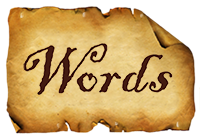
Passing Through — Cuckoo's Story As I write this at the end of June, the cuckoo is calling in my back garden. The West of Scotland is magical country, suitable for a magical bird, and we hear the cuckoo's call to tell us that spring is truly here, regardless of what the weather may be doing. But do you know Cuckoo's own story? This is what I was told... It seems that the gods decided (for godly reasons, no doubt) that they wanted to stop the to-ing and fro-ing between Tir na nÓg (the Land of Eternal Youth) and the mundane world. Probably having so many mortals (heroes and druids and suchlike) rollicking about lowered the property values. Anyway, they told everyone in Tir na nÓg, including all of the animals and all of the birds, that they would have to choose which world they wanted to live in — the world of immortality and stasis or the world of mortality and seasons, of growth and decay. (They forgot to tell the bees who, ever since, have simply ignored the whole thing and done as they pleased, but that's another tale.) Everyone made their choice except Cuckoo. She thought and she thought, but she couldn't decide. The gods probably said, 'Come on! Hurry up!' They probably tapped their toes impatiently. I don't know for sure, because I wasn't there, and she who reported what happened didn't say, but I expect that they did. It would be just like them. And I most definitely wouldn't like them tapping their toes like that at me. Poor undecided Cuckoo just couldn't make up her mind. At last she told the gods that she couldn't bear to live without the beauty and magic of Tir na nÓg, but neither could she give up growing and changing, living and bearing and someday, but please not too soon thank you very much, dying. She begged and she pleaded and she argued. She just wouldn't give up or give in. The gods got fed up with this and put their heads together (gods can do these things; the rest of us would probably get our brains all mixed and mushed up). After a certain amount of argument and cogitation, they made a decision. They said to Cuckoo, 'All right. You can continue to travel between the worlds. But there are conditions.' Poor Cuckoo's heart sank. You know what sort of things that gods tend to think up when they start thinking about conditions. 'First, you must agree to serve as our messenger between the worlds, carrying our messages to mortal creatures.' 'Oh, yes,' Cuckoo interrupted happily, her heart bobbing back up. 'I'd be honored to do that, Great Ones.' 'That isn't all,' they said grimly and smugly at the same time. Cuckoo's heart sank back down again, even lower. 'You must never build a nest in either world. You must lay your eggs in the nests of other birds to be hatched or not hatched by them, as they will. For this you will be castigated and vilified and blamed. If ever you build a nest in either world, you will be confined to that world evermore.' Now, when humans say 'evermore' it only means 'until we change our minds' or 'until we forget about it', but when the gods say it, they really mean it. Poor Cuckoo's heart fell on the ground and cracked. 'Does this mean,' she asked sadly, 'that I would not be allowed to feed and care for my own children, to nurture and protect and teach them?' 'Yes,' said the gods. 'Does it mean I'd have to depend on the charity of other birds for the well-being of my little chicks, for their very lives?' 'Yes,' said the gods. 'Does it mean that I would never know my own chicks, and they would never know their own parents?' 'Yes,' said the gods. Cuckoo thought and she thought. Her wings drooped sadly, and her heart felt as though it would crack forever in two. At last, she asked, 'But does it also mean that my children will have the freedom of both worlds, forever and evermore? 'Yes,' said the gods. 'You swear? No games, no tricks, and no more conditions?' 'Yes,' said the gods, squirming a little because they had been thinking of a godly trick or two. (I certainly do hope that the gods feel at least a little bit guilty and ashamed about this whole thing, because it was a terrible thing to do to anyone, least of all to a little bird with a loving mystic's heart.) So that is how cuckoo became a career woman with an important job to do. For this she paid the huge price of never knowing her own children, never being able to feed them and cuddle them warm, never feeling the pride of watching their first flight, never... never... never... But in exchange for the things she lost, she gained her chicks free entry to the Land of the Ever Young. Nowadays many people think that cuckoos migrate to Africa or somewhere every winter, and they are right. But on the way to and fro, they detour through Tir na nÓg, where they rest for a while, refresh their spirits, and pick up messages from the gods for delivery. This is why spring, when the cuckoos first arrive, is such a magical time and everything grows so quickly. They not only bring messages, but caught in their wings, they also bring a bit of the air and the magic of Tir na nÓg to a bereft mortal world. And this is why their song has such a mournful note. This is also why it is most unlucky to harm a cuckoo or a cuckoo's egg. It's every bit as bad as harming a wren, and you know what that means. This is also why it is important to listen, listen, listen with all your senses, inner and outer, high and low, when you hear the song of the cuckoo. There is always a message from the gods in it for you. And as exasperating as they can be at times, it's just as well to pay attention to the gods when they deign to speak to us. I know these things are true, not only because they are Celtic legend (which is the best and truest kind of legend), but also because the cuckoo swears they're true. And if you can't believe a messenger from the gods, who can you believe?
By the way, there is some very interesting and little-known information about the cuckoo in the article "Study shows some cuckoo birds may actually help their hosts".
Copyright © 1995 by Jessica Macbeth. All rights reserved.
|
|||||


